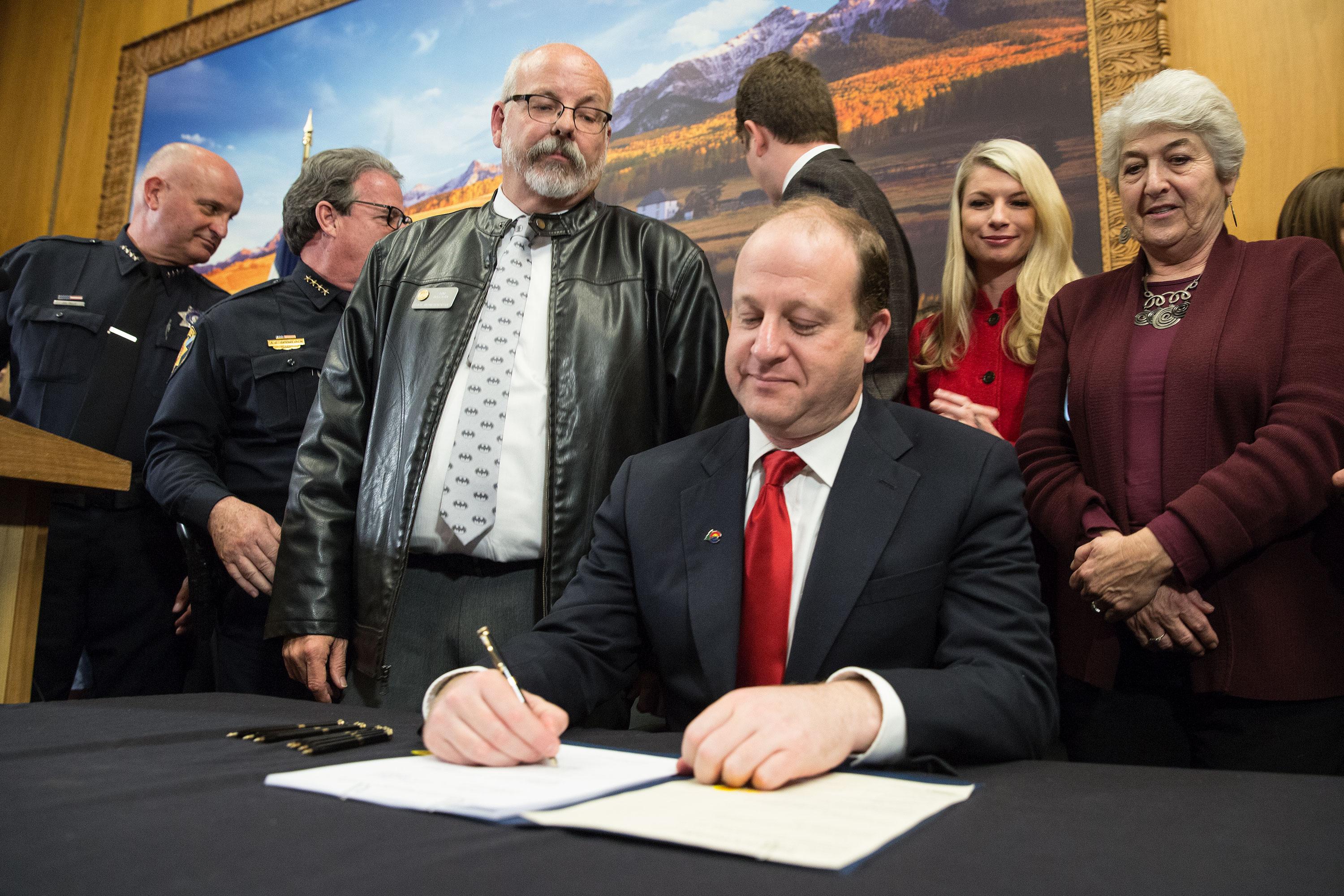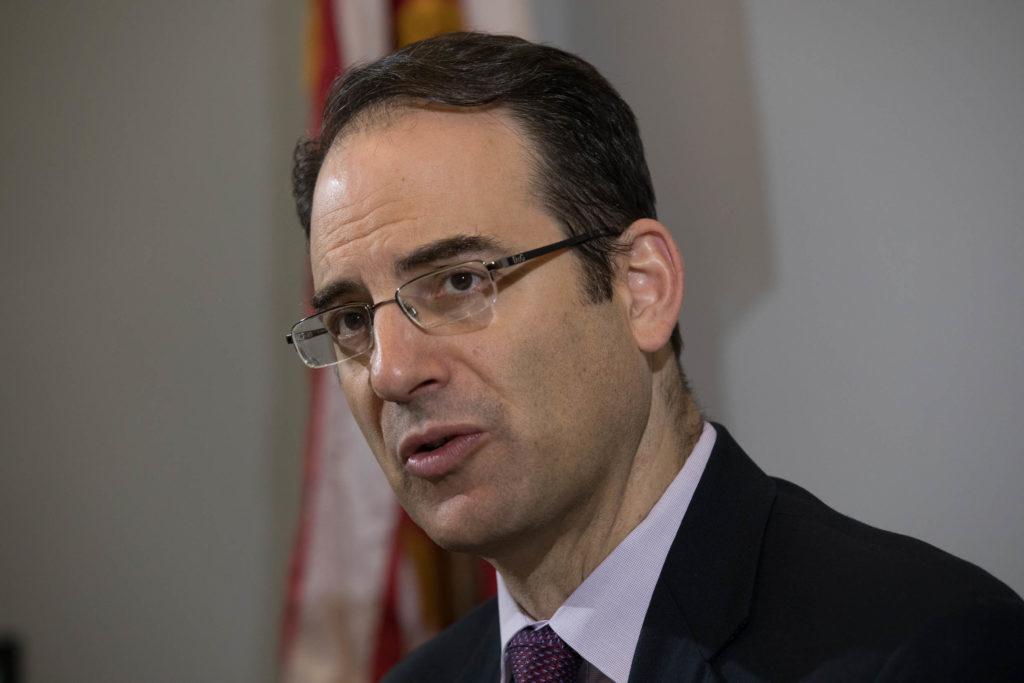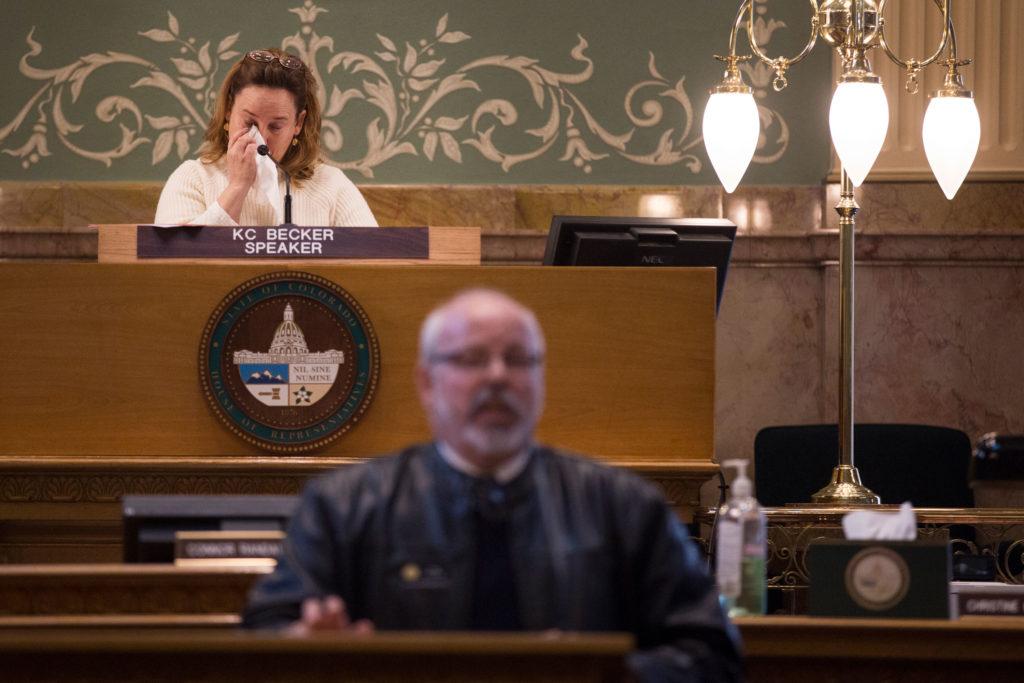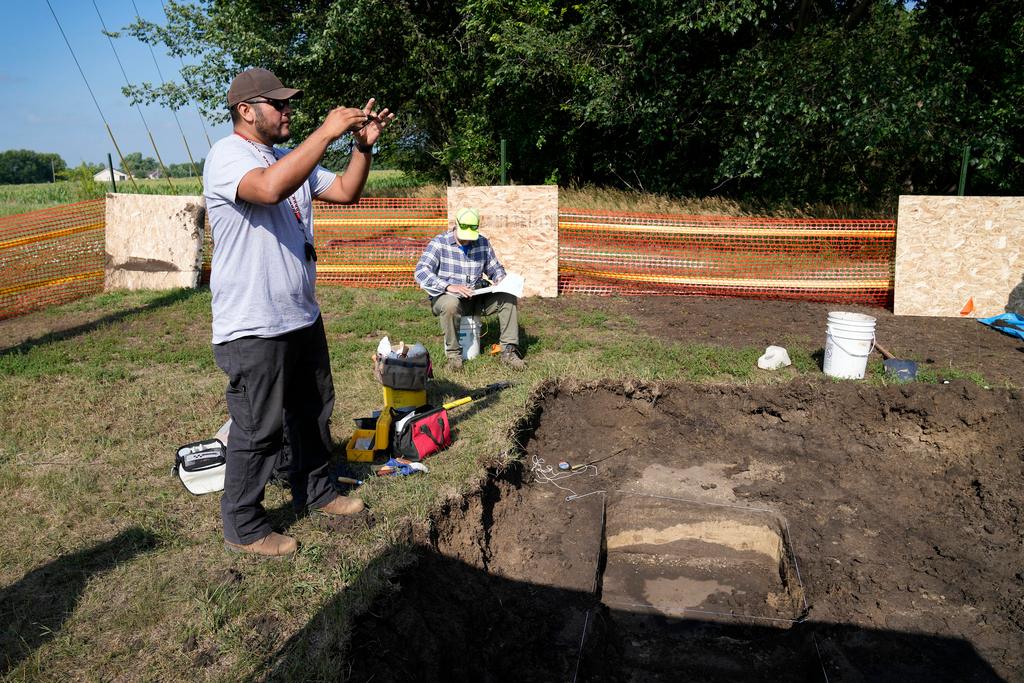
When Gov. Jared Polis signed Colorado's ‘red flag' law in 2019, he said the state had gained a powerful new tool to take on gun violence.
"We may be saving the life of your nephew or niece or grandchild who is 19 or 20 and suffering from a mental health crisis," Polis said at the signing ceremony. "We might also prevent the shootings of additional deputies, or even mass shootings."
A CPR News investigation into more than 300 red flag cases filed since the law took effect found dozens of cases where the law was used in response to fears of suicide, violence and even threats of mass shootings.
But it also revealed that the law is applied unevenly, with many law enforcement agencies using it only rarely — if at all. And while police often succeed when they file red flag petitions, private citizens are only rarely able to convince courts to order gun removals.
Democratic lawmakers were already discussing revisions to the law, but politicians and advocates are now considering additional changes in response to the series’ findings.
- Part 1: We read more than 300 red flag court cases, revealing significant differences in how police agencies and courts are approaching the law throughout the state.
- Part 2: Even when police don’t help, individual people can file a red flag case. But some domestic violence survivors say that they struggled to navigate the process and obtain a gun removal order — even as they feared for their lives.
- Part 3: Can a red flag order stop a mass shooting? We examined a dozen cases where someone allegedly threatened a mass shooting, sometimes in graphic detail. In some cases, police acted quickly to disarm the person — but the Pueblo Police Department struggled to convince a judge to intervene.
- Part 4: The Denver Police Department is the undisputed red flag leader of Colorado, using the law ten times more often than any other agency. The Boulware family explains how the process worked for them, and we learn why DPD has filed so many petitions.
The potential changes include increased law enforcement training in how to recognize and pursue red flag cases; more money for red flag efforts; and creating a statewide tip hotline to allow the public to pass along tips about people they’re worried about.
Democrats want police to use the law more often. But how?
Red flag cases can be filed by individual citizens or by police officers.
But in most counties, law enforcement agencies have never filed a petition. And even in many populous areas, police agencies have brought few if any ERPO cases so far.
That’s part of the reason that Colorado’s red flag law is being used at far lower rates, when accounting for population, than similar laws in Florida, Connecticut and Indiana.
In particular, domestic violence survivors and their advocates told CPR that they were frustrated by law-enforcement officers’ reluctance to get involved in cases where they believed a red flag order would help.
“My reaction to that situation is, it's a call to action to us to figure out how we better support victims, so that if they are either navigating law enforcement or (filing cases) on their own, we have better support for them. So they don't feel alone, isolated and afraid,” said Attorney General Phil Weiser.

The solutions, he said, could include increased training for law enforcement, as well as support services to help people understand the red flag process.
State leaders will consider adding the Extreme Risk Protection Order law as a topic in the required training for police officers, Weiser said. The state already is in the process of redesigning the Peace Officer Standards & Training curricula.
“I expect we will acknowledge (red flag orders) as a tool,” Weiser said. But he was unsure whether there would be enough space to add an entire ERPO-focused module.
Rep. Mike Weissman, a Democrat working on the topic, said the goal should be “helping law-enforcement officials of the future understand what their abilities are under the law, and the limitations, and when they should really think about using it in the interest of public safety. That makes sense.”
The AG’s office also will work with University of Colorado researchers and the state’s recently formed Office of Gun Violence Prevention to learn more about how cops are using the law, or why they aren’t.
Weiser said they want to know, “‘How's it going? If you haven't been using it much, well what are your concerns?’ Because we know it may take more than just having a training. It may take some higher touch.”
Due process concerns remain for many
Under ERPO, a judge may order a temporary gun removal — up to two weeks — before a person has any chance to respond. But the longer year-long orders can only happen after a court hearing, where the person can make their case with the help of a publicly funded lawyer.
As with other civil cases, respondents can appeal a red-flag order to a higher court. They also can request a hearing to end an order early. Once a year-long order expires, it can’t be renewed unless there’s another hearing.
Still, many conservatives criticize the concept of taking away someone’s guns when they aren’t being accused of breaking the law.
Rep. Mike Lynch, the Republican minority leader in the House, said that he remains concerned about due process in red flag cases, and he doubted the law had stopped much violence.

“We haven't seen huge a decrease in in shootings, nor have we seen it being used effectively and around the state,” Lynch said. He said that law-enforcement agencies were justified in taking a slow, skeptical approach to the law, and that the state does not need to encourage change in those attitudes.
“I have good faith in them and how they'll conduct their business, and they're not using the existing tool,” he said.
Sen. Tom Sullivan, a Democrat who sponsored the original bill and is working on revisions, said that attitudes could change as police learn more about the law.
“We still have to do a better job of educating everybody on what it is. And that doesn't mean just the public. That means law enforcement,” he said.
Sen. Paul Lundeen, the Republican minority leader in the Senate, said he wouldn’t comment in depth until he had seen a detailed proposal, but remained concerned about constitutional issues.
For places that want to use ERPO, would more money help?
The Denver Police Department has filed far more red flag petitions than any other agency. The department has dedicated a team of six employees who spend about half their time on ERPO cases — a significant expense.
Federal support could help others do the same. Federal officials recently announced that Colorado would receive $4.5 million for ERPO implementation from last year’s gun safety bill. That money will include grants to local departments, Weiser said.
Rep. Jennifer Bacon, the Democratic assistant majority leader, suggested that the state could use grants to incentivize ERPO use. “We have our power of the purse,” she said. “If we’re going to issue grants, we can expect things in return.”

Lynch, the Republican House leader, said that police should instead focus on enforcing criminal law, not filing ERPO civil cases. In cases where an armed person is making disturbing statements, police should put them under surveillance, he said.
“It gets back to basic law enforcement where you identify those threats, you put the resources to watch them. And until they've committed a crime, they're not criminals. They don't deserve to have law enforcement breaking into their house or walking into their house, reaching into their private space,” he said.
Could a “Safe2Tell” hotline help with red flag cases?
If someone files a red flag petition against you, you are guaranteed the right to a free-of-charge attorney to help fight the case.
In contrast, people who are seeking red flag orders against others aren’t guaranteed any kind of help; if police don’t take their case, they’re left to file paperwork and navigate the system on their own. That’s part of the reason that more than 80 percent of individual petitioners fail to get a red-flag order.
One domestic violence survivor suggested that people should be able to call into a statewide hotline and make reports about people who may pose a threat to themselves or others.
“People who are in that situation and observing their loved ones and their friends or their coworkers should have a place where they can call and say, ‘This is what's going on,’” said the woman, who requested anonymity because she feared for her safety.

It’s not an entirely new idea in Colorado; the state established the Safe2Tell system after the Columbine massacre to allow young people to report anonymously if they feared a classmate was at risk of suicide or violence. The system received more than 19,000 tips in the last school year.
A hotline could also help people file a red flag petition by connecting them with local police and court officials, as well as answering questions about the ERPO process, the woman suggested.
Bacon said that could “be on the table” and that it’s a good suggestion. She added: “It's been really incredible to hear from people who have had to go through this process. And that is something I think legislators need to hear.”
She also wants to see the Office of Gun Violence Prevention take a greater role in promoting the law’s use.
“We're not sure that they're doing it the best that they can,” Bacon said. “There's been a lot of conversation about strengthening the role of the Office of Gun Violence Prevention.”
Bacon also suggested that agencies could be required to create and publicize documents that explain the ERPO process and how people can seek red flag orders on their own.
Lynch said he was open to the idea of creating more educational resources about ERPO, mostly in the hopes that it would discourage people from filing frivolous petitions.
Does Colorado need more data?
The state currently makes basic data about the use of ERPO available. Information from the state justice department shows how many red flag petitions have been filed in each judicial district. But it does not show how many times an individual police agency has used the law.
To understand how the law is being used around the state, CPR News spent dozens of hours checking into each case individually, and found many jurisdictions where law enforcement hasn’t filed a single case, as well as places, like El Paso County, where it appears that law enforcement’s hostility to ERPO has led more private citizens to file them.
Lawmakers were open to the idea that the state should collect and compile those agency-level statistics.
“I think it might also be fair to share publicly the data for the gaps and the inconsistencies across counties,” Bacon said.
Weissman said he supports greater transparency, but it would depend on what’s possible with the state’s court data system.
“I just don’t know what would be necessary in terms of resources, programming and whatnot to make that possible,” he said.
Some lawmakers also want to see police agencies explain more of their decisions about red flag cases — such as their thinking when they allow a red-flag order to expire, rather than renewing it.
In most jurisdictions, if the police decide not to renew a petition, they do not give any formal explanation for their decision. But in Denver, police officers often will file paperwork explaining why a person should be allowed to have their guns back. For example, a followup investigation might find that the person no longer is expressing suicidal thoughts.
“I think that is an incredible show of diligence,” Bacon said. “The fact that some people aren’t checking if it worked worries us a little bit.”
Should more people be able to file red flag petitions?
Under Colorado’s law, only two groups of people can ask the courts for a red-flag order. First, there’s law enforcement. Otherwise, petitions can only be filed by those with close relations to the person in question, such as family members, roommates, romantic relations and co-parents.
Democratic lawmakers may add to that list. The most certain idea is to allow district attorneys to file petitions, too. It’s something Gov. Jared Polis specifically called for in his State of the State address.
Giving district attorneys the power to petition could create a backup option in cases where local police decide not to help. If the sheriff’s office “doesn’t want to or won't do it, then maybe the DA finds enough reason to be able to do it,” Sullivan said.
Early negotiations also have focused on whether educators, medical professionals and mental-health professionals should be allowed to initiate cases.
“Could this be an additional tool for people who have closer relationships with folks who might be troubled?” Bacon asked.
Hawaii, Maryland and Connecticut allow healthcare professionals to file petitions, but, but there’s no sign yet it’s making a big difference, said April Zeoli, associate professor at the Institute for Firearm Injury Prevention at the University of Michigan.
“We know that they're not petitioning in great numbers at this point, but that may be due to the newness due to trying to figure out how this works,” she said. “It's really too soon to tell.”
Lynch said that expanding the law to include educators and others would do little.
“I don't know how expanding a tool that's not being utilized by the professionals that are on the ground is going to increase its efficiency,” he said.
Should police and others be required to file petitions?
So far, politicians involved in ERPO say they prefer to leave red flag decisions to each department and judge, rather than trying to force the authorities to seek and issue orders more often.
“They’re brand new in hearing this, so our hope would be that maybe they get a little better at this, maybe they open up a little bit more,” Sullivan said.

Hart Van Denburg/CPR News
Bacon said that if the law expanded to include health professionals and others, those groups still should not be required to file petitions. It should be left to their discretion, she said.
“Some of the feedback that we’ve heard, particularly in the mental health space, is that requirements may push people away from utilizing services or wanting to get some help,” she said.
New York has taken a harder-edged approach, hoping to force police to use the law. A recent change requires police and district attorneys to file ERPO petitions in certain situations, rather than giving them discretion. Months later, the governor’s office reported a sharp increase in the law’s usage.
Another potential approach would be to make agencies liable for failure to file a red flag order in cases where a person later commits acts of violence. Weissman said that more aggressive moves like that are not on the table this year. “I don’t think it would really be effective to try to compel individuals on threat of liability,” he said. “... I think one place that the threat of liability could go wrong is pushing possible petitioners into maybe filing (a case) when the showing isn’t there.”
Sullivan said that, eventually, he’s interested in pushing departments harder to use the law, including through liability But the changes are almost guaranteed to start smaller. His bill to update the red flag law has not yet been introduced.









